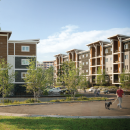How to Convert Your Apartment into the Ideal Office Space

Over the last few years, working entirely or partially from home has now become the reality for many of us. With this comes plenty of added freedom, such as spending less time and money on commuting (does anyone really miss commuting?), but it can also present challenges when your home becomes your office space too.
Choose a room with adequate space and minimal distractions
One of the problems with working at home can be competing with kids, pets, or others vying for attention in your apartment. However, you also need to find a room with adequate space for setting up your office desk, chair, computer, and other related gear. You also need to take cleanliness into account—no one wants their laptop ruined by having it plopped down onto spilled milk on the kitchen table.
There are numerous factors to consider when looking at a specific room:
-
Is there enough space for your desk?
-
Will it be possible to create more space by rearranging certain items?
-
Can you minimize distractions?
-
Would it be possible to move potentially distracting items like a TV or home phone into another room?
-
Can you keep the pet(s) out of the room?
Sometimes, the bedroom can double as the office, while in other cases, the living room may work better. Some people may opt to live in an apartment with an extra bedroom that can be converted into an office. It all depends on how much space you have, who else—if anyone—you live with (person or pet), and what the layout of your apartment is like.
 Keep your personal workspace clean and ready
Keep your personal workspace clean and ready
One great feature in video call apps is the background filter, which allows you to blur out your background or replace it with another image, such as a simple rendering of a much tidier room or even a medieval castle, if you’d like. Yet, you may find yourself in a situation where your background filter glitches and you suddenly find yourself feeling very exposed. Sometimes, it’s as if a ghost is lurking behind you and part of the filter suddenly becomes transparent for no logical reason. Additionally, some apps may only provide background filters that are semi-transparent, meaning that your background could still be somewhat visible even when partially blurred out.
We get it. Not all of us are neat freaks, and background filters make it easy to hide the messiness in our home workspace.
Ideally, you should at least maintain a bare minimum of neatness in your room where it is presentable for these unfortunate occasions. It doesn’t need to be perfect—just organized enough that people will forget all about that one time your filter stopped working. Keep an eye out for anything that could be considered inappropriate for a workplace setting, such as controversial or off-colour posters, books, or items within your space.
Set boundaries within your apartment
Whether they’re your children, significant others, family members, friends, or pets, you may sometimes need to set boundaries with who you live with when your apartment also becomes your office space. Obviously, there are some exceptional cases in which you’ll still need to devote some attention to your apartment companions—babies, for instance. In other cases, it is necessary to draw the line between work time and social time as well as between workspace and social space.
These boundaries could mean setting aside your room as the designated workspace for the duration of your working hours. In addition, they also indicate that nobody should access that room during that time except when necessary. When your office space is a shared bedroom with your significant other, planning to minimize interruptions may be necessary.
Have the ideal lighting conditions
Lighting can be key toward a good office space, which can include both natural and artificial light. Certain people work better under different lighting conditions. However, you also want to consider how you appear when on video calls. Being shrouded in darkness may work if you’re a movie villain, but it’s not necessarily an ideal look when on video calls in today’s working world.
Choosing a room with the right lighting conditions can be important. Factor in any windows and the direction of the sunlight at the time of day when you are working. Too much direct light can be distracting or uncomfortable, so consider investing in curtains that are easy to move up and down to varying degrees.
If the natural lighting conditions are unfavourable in an otherwise favourable room for your personal workplace, then start thinking about artificial lighting implementation and whether the room allows for such placement.
You may also note that working from home can affect your electrical and heating bills, depending on the season and whether these bills are already covered in your rent. Therefore, choosing a room with plentiful natural lighting can help you save up on your hydro and heat costs. Conversely, on hot summer days, you may want to ensure that you have good curtains that effectively block out the sun in order to minimize the air conditioning bill.

In addition to lighting, you may want to consider the placement of electrical sockets for plugging in your computer and any other devices. Extension cords, power strips, and multi-socket adapters can be useful tools if you aren’t exceeding the safety limit of how many devices can be plugged in at once. Check out this handy article to learn more about how many devices you can safely plug in at once.


